02:21
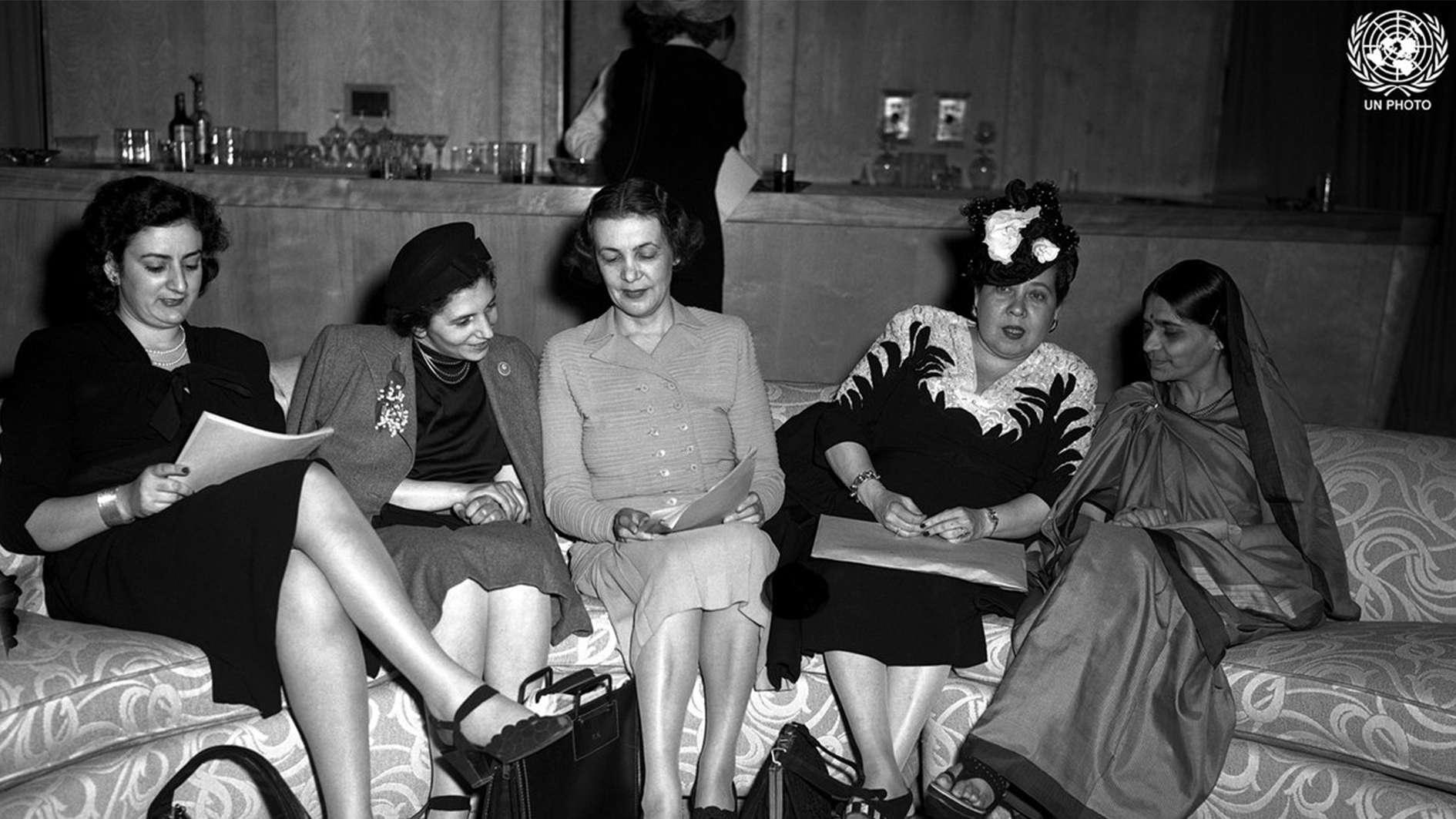
As the world celebrates the 70th Human Rights Day on Monday to mark the adoption of the Universal Declaration of Human Rights (UDHR) by the United Nations on December 10, 1948, it is intriguing to know that had it not been for the efforts of women in the drafting committee, even the words "human" and "women" would not have found a place in the document as the word "man" was meant to include both the genders at the time, as revealed by Stockholm University senior lecturer Rebecca Adami in her recent book.
The UN Charter stated that promoting human rights is part of its core mission and the UDHR was conceived to further define these rights, which it eventually did in its 30 Articles. "Inclusion of women in the declaration was very important in order to make sure that this was a document on human rights and not the rights of man," Rebecca told the UN News last week after the launch of her book titled "Women and the Universal Declaration of Human Rights."
01:46
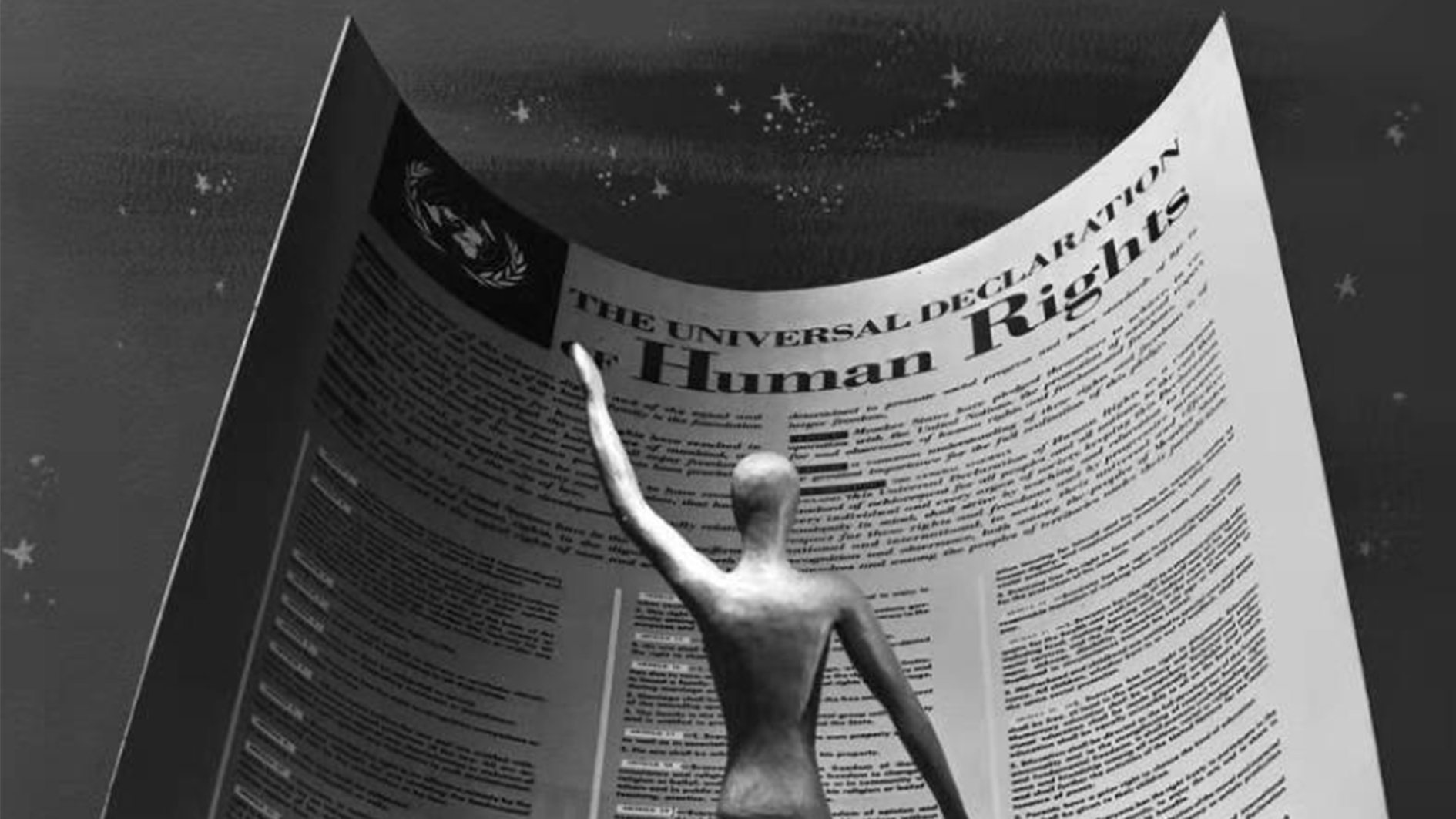
It was Hansa Mehta of India, the only other female delegate besides the former US first lady Eleanor Roosevelt to the UN Commission on Human Rights in 1947-48, who ensured the inclusion of women in the UDHR which in its initial draft mentioned only about the rights of the "man." Hansa is widely credited with changing the phrase "All men are born free and equal" to "All human beings are born free and equal" in Article 1 of the document, the book reveals.
The UDHR eventually proclaimed the inalienable rights which everyone is inherently entitled to as a human being – regardless of race, color, religion, sex, language, political or other opinions, national or social origin, property, birth or other status.
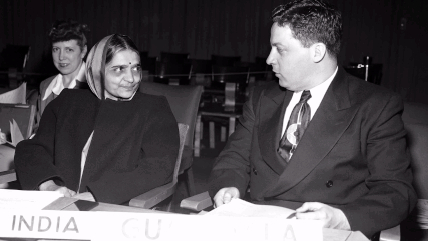
Hansa Mehta of India (left) with Carlos Garcia Bauer, representative of Guatemala, before a meeting of the UN Commission on Human Rights, New York, June 1949. /UN Photo
Hansa Mehta of India (left) with Carlos Garcia Bauer, representative of Guatemala, before a meeting of the UN Commission on Human Rights, New York, June 1949. /UN Photo
Launched last Wednesday at the UN Dag Hammarskjold Library in New York, Rebecca's book chronicles how women, especially from Latin America and newly independent countries such as India and Pakistan, played a critical role in the drafting of the declaration, which along with the UN Charter, is considered among the two defining documents on human rights.
The book also examined the historical narrative of human rights from the San Francisco Conference in 1945 to the final vote of the UDHR in the United Nations General Assembly in December 1948. "The book is a gendered and counter-narrative to the dominant notion that the UDHR was a document drafted only by men with a few women," the author emphasized.
How men got it wrong
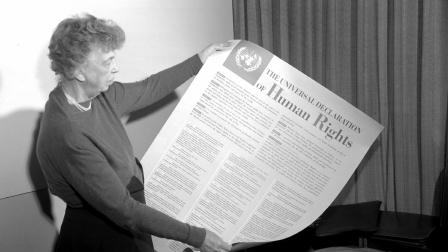
Eleanor Roosevelt of the United States holds a poster of the Universal Declaration of Human Rights, in New York, November 1949. /UN Photo
Eleanor Roosevelt of the United States holds a poster of the Universal Declaration of Human Rights, in New York, November 1949. /UN Photo
While Eleanor Roosevelt's role as the first chairperson of the UDHR drafting committee is well documented, Rebecca in her book attempts to put spotlight on other female delegates, particularly from non-Western countries, who have left an indelible mark on the landmark document which is now the world's most translated document and available in more than 500 languages.
However, initially during the drafting process, men thought that "the declaration wasn't going to be much of anything," Rebecca told UN News, adding that not many male delegates at the time wanted to serve the UN General Assembly's Third Committee that dealt with human rights, humanitarian affairs and social matters.
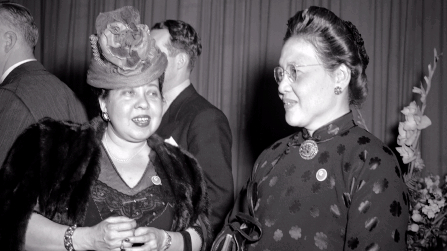
Minerva Bernardino of the Dominican Republic (left) with Way Sung New of China, members of the Sub-Commission on the Status of Women of the Commission on Human Rights, New York, April 1946. /UN Photo
Minerva Bernardino of the Dominican Republic (left) with Way Sung New of China, members of the Sub-Commission on the Status of Women of the Commission on Human Rights, New York, April 1946. /UN Photo
"I don't think that they really understood that working with the UDHR was going to be important and vital for the future," she quipped, pointing out that "it was the strength of women such as Minerva Bernardino from the Dominican Republic, Begum Shaista Ikramullah from Pakistan, and Hansa Mehta from India that proved them wrong."
A diplomat and feminist leader, Minerva was instrumental in arguing for the inclusion of "the equality of men and women" in the preamble. Together with other Latin American women such as Bertha Lutz of Brazil and Isabel de Vidal of Uruguay, Minerva had also played a crucial role in advocating for the inclusion of women's rights and non-discrimination based on gender in the UN Charter.
Pakistan's Begum Shaista, delegate to the Third Committee in 1948, championed the inclusion of Article 16 on equal rights in marriage, which she saw as a way to combat child marriage and forced marriage. She also advocated for emphasis on freedom, equality and choice in the declaration.
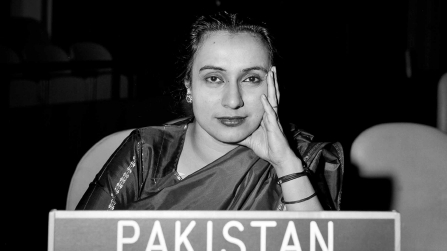
Begum Shaista Ikramullah, delegate of Pakistan to the UN Third Committee, in the General Assembly Hall in December 1956, New York /UN Photo
Begum Shaista Ikramullah, delegate of Pakistan to the UN Third Committee, in the General Assembly Hall in December 1956, New York /UN Photo
Hansa's argument on the usage of an inclusive language was extended by many other female members of the UN.
Bodil Begtrup of Denmark advocated for the UDHR to refer to "all" or "everyone" as the holders of the rights, rather than "all men" while Marie-Helene Lefaucheux of France successfully advocated for a mention of non-discrimination based on sex to be included in Article 2.
Evdokia Uralova of the erstwhile Soviet Byelorussia strongly argued for equal pay for women. Thanks to her, Article 23 states that “Everyone, without any discrimination, has the right to equal pay for equal work.” Together with Fryderyka Kalinowska of Poland and Elizaveta Popova of the Union of Soviet Socialist Republics, she also stressed the rights of persons in Non-Self-Governing Territories.
West and the rest
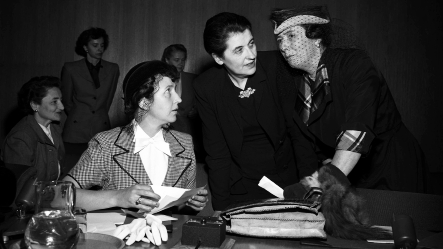
From left: Marie-Helene Lefaucheux of France, chairperson of the Commission on the Status of Women; Mary Sutherland of the United Kingdom; and Olive Remington Goldman of the United States, New York, January 1948 /UN Photo
From left: Marie-Helene Lefaucheux of France, chairperson of the Commission on the Status of Women; Mary Sutherland of the United Kingdom; and Olive Remington Goldman of the United States, New York, January 1948 /UN Photo
The author, however, suggested that even the female delegates were divided on several issues with an evidently clear split between the Western and non-Western members.
"A female delegate from the US, for example, said they against the equal rights amendment because they were afraid that protective legislation of women would be sacrificed if you had emancipation of women and if you treat women as [you would treat] men," Rebecca said.
Also, "some Western countries felt that we do not need to mention 'women' because 'women' are included in the wording 'man,'" she added.
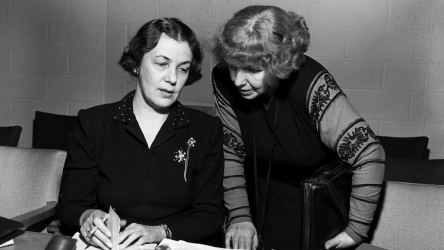
Bodil Begtrup of Denmark (left), with Dorothy Kenyon of the United States, before the opening of the Second Session of the Commission on the Status of Women, New York, January 1948 /UN Photo
Bodil Begtrup of Denmark (left), with Dorothy Kenyon of the United States, before the opening of the Second Session of the Commission on the Status of Women, New York, January 1948 /UN Photo
"Women members from other countries, especially from Latin America, India and Pakistan, fiercely countered this contention by arguing that we need to mention women explicitly in the text because otherwise it might be interpreted in some countries as not being inclusive of women's rights," Rebecca elucidated.
"It was really fascinating to see how these women from other countries, especially, newly-independent countries such as India and Pakistan, who played prominent roles in the independence movement of their countries taking part in demonstrations on the streets, contributed significantly to the UDHR," she added, citing that both Hansa and Begum Shaista were members of the panels that drafted the first constitutions of their respective countries.
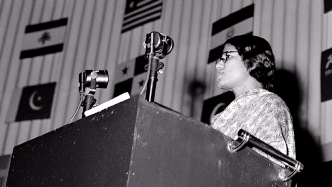
Lakshmi Menon of India addresses the UN General Assembly prior to the adoption of the Universal Declaration of Human Rights, at the Palaise de Chaillot, Paris, France, December 9, 1948. /UN Photo
Lakshmi Menon of India addresses the UN General Assembly prior to the adoption of the Universal Declaration of Human Rights, at the Palaise de Chaillot, Paris, France, December 9, 1948. /UN Photo
Meanwhile, another Indian delegate to the Third Committee in 1948, Lakshmi Menon, opposed the concept of “colonial relativism” that sought to deny human rights to people in countries under colonial rule. If women, and people under colonial rule, were not explicitly mentioned in the Universal Declaration, they would not be considered included in “everyone,” she argued.
"To have these very strong advocates of women's rights and human rights against colonialism at the UN table when the UDHR was being drafted is something that is truly historical," said Rebecca, adding that "it is very inspirational to learn about these women and the prominent role they played in politics and legislation at an international level."
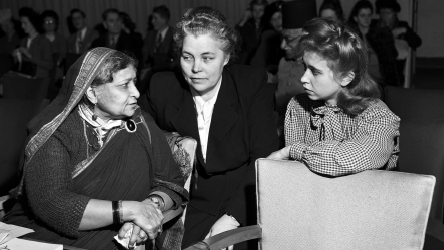
Before the first meeting of the second session of the Commission on the Status of Women, Begum Hamid Ali of India (left) talks to Evdokia I. Uralova, Byelorussian Soviet Socialist Republic (center), and her interpreter, New York, January 1948. /UN Photo
Before the first meeting of the second session of the Commission on the Status of Women, Begum Hamid Ali of India (left) talks to Evdokia I. Uralova, Byelorussian Soviet Socialist Republic (center), and her interpreter, New York, January 1948. /UN Photo
It is also worth mentioning that at a time of increasing East-West tensions, Eleanor Roosevelt used her enormous prestige and credibility to steer the drafting process toward its successful completion for which she was posthumously awarded the United Nations Human Rights Prize in 1968.
Moved by Rebecca's book, the UN has chosen to pay a special tribute to this distinguished group of women in the lead up to the Human Rights Day. The UN on its official website has created a special page on
"Women who shaped UDHR" detailing the contribution of this distinguished group of women from around the world who have contributed phenomenally to the narrative on human rights.
[Cover Photo: From left - Angela Jurdak (Lebanon), Fryderyka Kalinowski (Poland), Bodil Begtrup (Denmark), Minerva Bernardino (Dominical Republic), and Hansa Mehta (India), delegates to the UN's Sub-Commission on the Status of Women, New York, May 1946 /UN Photo]











